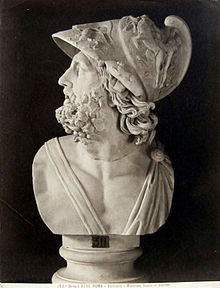Menalaus
| Menelaus | |
|---|---|
| King of Sparta | |

Marble bust of Menelaus
|
|
| Predecessor | Tyndareus |
| Ex-Wife | Helen of Troy |
| Issue | |
| Father | Atreus |
| Mother | Aerope |
In Greek mythology, Menelaus (/ˌmɛnɪˈleɪəs/; Greek: Μενέλαος, Menelaos, from μένος "vigor, rage, power" and λαός "people," "wrath of the people") was a king of Mycenaean (pre-Dorian) Sparta, the husband of Helen of Troy, and the son of Atreus and Aerope. According to the Iliad, Menelaus was a central figure in the Trojan War, leading the Spartan contingent of the Greek army, under his elder brother Agamemnon, king of Mycenae. Prominent in both the Iliad and Odyssey, Menelaus was also popular in Greek vase painting and Greek tragedy, the latter more as a hero of the Trojan War than as a member of the doomed House of Atreus.
Although early authors, such as Aeschylus refer in passing to Menelaus’ early life, detailed sources are quite late, post-dating 5th-century BC Greek tragedy. According to these sources, Menelaus' father, Atreus, had been feuding with his brother Thyestes over the throne of Mycenae. After a back-and-forth struggle that featured adultery, incest and cannibalism, Thyestes gained the throne after his son Aegisthus murdered Atreus. As a result, Atreus’ sons, Menelaus and Agamemnon, went into exile. They first stayed with King Polyphides of Sicyon, and later with King Oeneus of Calydon. But when they thought the time was ripe to dethrone Mycenae’s hostile ruler, they returned. Assisted by King Tyndareus of Sparta, they drove Thyestes away, and Agamemnon took the throne for himself.
...
Wikipedia
